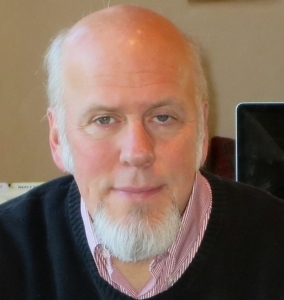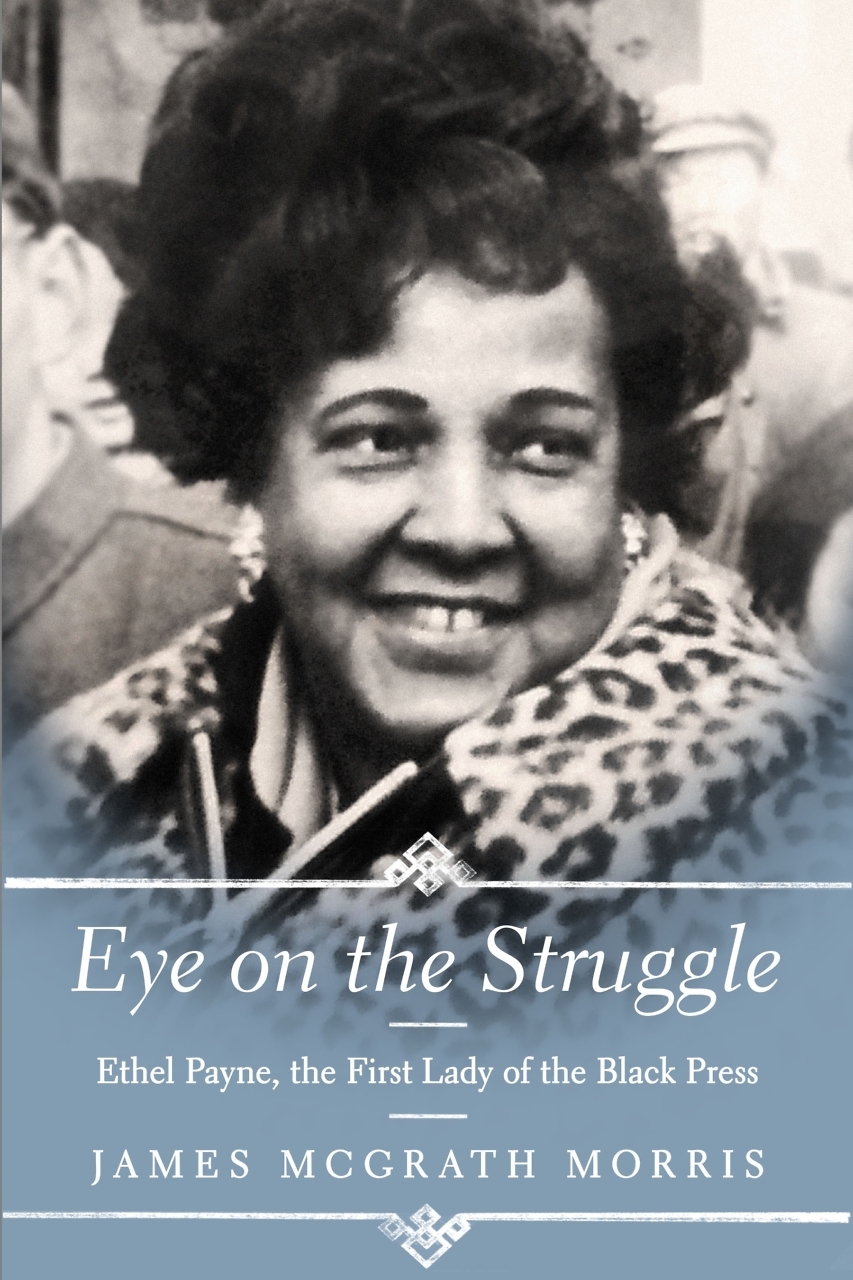Imagining the Future, but Not Predicting It
Margaret Atwood discusses her work and her concern for the planet
One of the most popular and prolific authors in the world, Canada’s Margaret Atwood is also among the most gifted writers of her generation. She has written more than forty books of poetry, fiction, and critical essays and she has received an array of international awards, including Britain’s prestigious Booker Prize, which she won in 2000 for her novel The Blind Assassin.
Atwood has always been lauded as a writer with the rare ability to create great literature shaped by a powerful social and political conscience. Feminism, anti-imperialism, and environmental concerns have all come into play in Atwood’s work, in poems such as “Backdrop Addresses Cowboy,” and in novels including The Edible Woman and Alias Grace.  Atwood has a longstanding interest in science fiction, and she has written several works of what she calls “speculative fiction,” a sort of sub-genre that eschews the more fantastic elements of classic sci-fi and imagines possible futures based on real trends and technologies. Her most recent novel, The Year of the Flood, is set in a dystopian world in which much of humanity is wiped out by a bio-engineered virus. The book is a continuation of her 2003 novel Oryx and Crake and features a group of religious “eco-guerillas” known as God’s Gardeners. As part of the tour to launch The Year of the Flood, Atwood took part in a series of locally produced performances with actors interpreting the novel’s major characters, and singers performing the hymns. A “traveling medicine show,” the performances were intended to increase environmental awareness and activism.
Atwood has a longstanding interest in science fiction, and she has written several works of what she calls “speculative fiction,” a sort of sub-genre that eschews the more fantastic elements of classic sci-fi and imagines possible futures based on real trends and technologies. Her most recent novel, The Year of the Flood, is set in a dystopian world in which much of humanity is wiped out by a bio-engineered virus. The book is a continuation of her 2003 novel Oryx and Crake and features a group of religious “eco-guerillas” known as God’s Gardeners. As part of the tour to launch The Year of the Flood, Atwood took part in a series of locally produced performances with actors interpreting the novel’s major characters, and singers performing the hymns. A “traveling medicine show,” the performances were intended to increase environmental awareness and activism.
Atwood recently spoke with Chapter 16 by phone from her home in Toronto. Direct and incisive, with a wry sense of humor, Atwood offered observations on her work, her involvement with activism, and the moral questions surrounding the use of technology.
Chapter 16: Your poems are always crystal clear; you don’t seem to have much use for obscure language. Is that an aesthetic choice or is that just the way you think?
Atwood: It’s just the way I think. When people say, “What on earth does this mean?” you know that either they’re having a reading problem or that you had a writing problem.
Chapter 16: So you don’t think being obscure is ever a virtue?
Atwood: Every poet uses figurative language; every poet uses references that other people may not get. I don’t consider those virtues or not virtues but just part of the nature of poetry, and it’s probably part of the nature of writing because that can happen with prose as well. There are always three things in the equation: there’s the author, there’s the work, and there’s the reader. There may be a disconnect between the author and the work, there may be a disconnect between the work and the reader.
Chapter 16: In your speculative fiction—in The Year of the Flood and also The Handmaid’s Tale—people are punished pretty severely for their arrogance. The arrogance takes different forms in the two stories, and one’s much more catastrophic, but in The Handmaid’s Tale, the people in power are as miserable as the people that they subjugate.
Atwood: I think the people at the top are having a reasonably good time.
Chapter 16: They seem very unhappy.
Atwood: Well, that’s different. You mean the Commander has his little areas of nostalgia. Yes, he has his little areas of nostalgia but he’s not about to give up his position. Any dictatorship is shaped like a pyramid and those at the top have a better time than those at the bottom, which is their point.
Chapter 16: So you don’t believe in any sort of karmic justice.
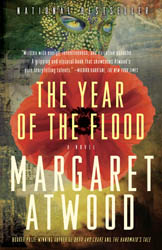 Atwood: Karmic justice, that’s a hard one. For instance, when the Titanic went down, a lot people immediately leapt into the press to say that it was God punishing humans for their arrogance in having created such a big boat. When the Franklin expedition disappeared, they said the same thing. When 9/11 hit, we got some of the same thing from some people, and we got some of the same thing about Katrina. There are always going to be people willing to step forward—in fact, eager to step forward—and say, “Look what God is going to do to you because of your bad behavior.” Do I believe in that? No, nor do I believe that 9/11 happened because some Americans are gay. I don’t believe that; sorry.
Atwood: Karmic justice, that’s a hard one. For instance, when the Titanic went down, a lot people immediately leapt into the press to say that it was God punishing humans for their arrogance in having created such a big boat. When the Franklin expedition disappeared, they said the same thing. When 9/11 hit, we got some of the same thing from some people, and we got some of the same thing about Katrina. There are always going to be people willing to step forward—in fact, eager to step forward—and say, “Look what God is going to do to you because of your bad behavior.” Do I believe in that? No, nor do I believe that 9/11 happened because some Americans are gay. I don’t believe that; sorry.
Do I believe in the Second Law of Thermodynamics? Yes. Do I believe if I jump off the Empire State Building I will probably die? Yes, I do believe that. Do I believe that as the world warms, the winds get stronger? Yes, and warmth creates more evaporation, and what goes up must come down in the form of rain. I do believe that. It’s not a question of belief in those instances. Is some form of karmic justice being worked out? No. Have choices that we have made created a different sort of climate than the one we’ve been used to for the past couple of hundred years? Yes. Is that going to have bad effects on some people? It’s already having them. Is it their fault? No.
Chapter 16: It’s someone’s fault.
Atwood: Well, fault… Did they do it on purpose? No. Were they the cause of it? Maybe—but not them, probably other people—their ancestors, somebody somewhere else. Is it people’s fault? No, they were not intending these results. Were they the proximate cause? Most likely. That’s different from fault. Fault means they have the moral responsibility, that they’ve been bad.
Chapter 16: Do you think there is any moral responsibility?
Atwood: In your individual life, absolutely. And once you know that there’s a problem, presumably you have some kind of moral responsibility to do something about it. But the problem with the problem that we have today is that nobody quite knows what to do. So, I don’t think it’s a question of telling everybody that they’re bad. That’s not going to have any positive result anyway. They’ll just say, “OK, so I’m bad. So I need to pay my mortgage. What are you suggesting I do? Let my family freeze to death? No, thanks.”
Chapter 16: How hopeful do you feel that this situation can be turned around?
Atwood: I feel hopeful on the local and municipal level, because we’re already seeing a lot of those kinds of actions taking place. Am I hopeful on the national and international level? Not particularly at this point. It really is a question of who’s going to go skinny-dipping first. Who’s going to take all their clothes off and leap into the icy cold water, and then have all the others run away with their clothes? They’re not going to do it unless everybody does it because they will feel they’re putting themselves at a disadvantage.
Chapter 16: Is local action enough?
Atwood: Sure, if all localities acted, then you’d have it done. And they do act when they figure out how much money they can save. It really is a question of “follow the dollar.”
Chapter 16: But the dollar issue is always the argument that’s made against doing these things.
Atwood: On a national and international level, yes. But [not] on an individual, local and municipal level. If you go onto a website called Zerofootprint and look up the Zero Challenge, which is getting high schools to cut down their energy footprint, and figure out how much money they can save by doing it, and that they can then spend that money on other things that they might need, such as libraries and football outfits, then you’ve got something going.
Chapter 16: You’ve been involved in environmental activism for a long time….
Atwood: Let’s make this clear: I’m not a professional activist. Professional activists have offices, they have staff, they have salaries, they spend their whole lives doing this.
Chapter 16: But you’ve used your book tour for The Year of the Flood to promote environmental activism.
Atwood: Yeah, it was quite crazy. It happened because one of the outfits I am involved with called BirdLife International said, essentially, “How do we move outside the circle we’re already inside, and get other people to understand what it is we’re doing, and why it’s important?” And I said, “Through the arts.” At which point they all looked at me. So you can see what would follow next.
Chapter 16: That was as good as volunteering?
Atwood: I’m afraid so. I should have said, “Well, you could do it through the Miner’s Association; go to them.”
Chapter 16: Were all the performances in Canada?
Atwood: Oh, no; in fact, we just did two in Japan. You can go on my blog my blog or my Facebook page and look up the Japan Year of the Flood events. You can see the three actors. We brought a Canadian director and three Canadian singers, and then it was three Japanese actors and a Japanese director. The actors acted in Japanese, the singers sang in English, and the audience had Japanese lyrics. I spoke in English and I had a Japanese [interpreter]. We [also] did a number of them in the States, and we started in England. If you search In the Wake of the Flood, it’s a documentary film [directed by Ron Mann]. He followed the tour around. At every stop I was usually meeting with green groups in various places and finding out what they were doing.
Chapter 16: And all your travel for that was carbon neutral?
Atwood: We offset it. We couldn’t, obviously, offset all of it, because that would have involved finding out how far every person who came to the event traveled, and what form of transportation they used, what they ate in the lobby, how much electricity was used in the church or theater, all those kinds of things, which would have been an impossible calculation for me to do. Not that it’s not doable; it’s just that it was too much for us to do. But we did all the travel.
Chapter 16: Do you use the same approach with your other travel, such as when you come to Nashville?
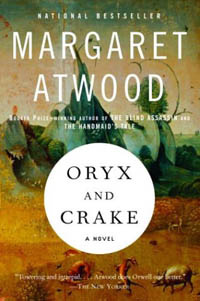 Atwood: We offset all of it. We do it through two companies. One is called Zerofootprint, and the other one is called Offsetters. There is some debate about how efficacious all of that is, but there’s some debate about how efficacious everything is. The other big focus [on the tour] was the shade-grown coffee.
Atwood: We offset all of it. We do it through two companies. One is called Zerofootprint, and the other one is called Offsetters. There is some debate about how efficacious all of that is, but there’s some debate about how efficacious everything is. The other big focus [on the tour] was the shade-grown coffee.
Chapter 16: Is that something you’ve been involved with for a long time?
Atwood: No, I really started doing it with tour, because I didn’t know much about it either, but there’s a book by Bridget Stutchbury called The Silence of the Songbirds which makes the connection between coffee growing and migratory North American songbirds, and also indigenous resident birds.
Chapter 16: I didn’t realize it affected North American birds.
Atwood: Yes, particularly for them, because coffee is grown in Central America, and that’s where they spend the winter. If you go to the Smithsonian website and look at their coffee materials, they do certification of bird-friendly coffee. An outfit in Toronto said, “Can we use your name and put out a bird-friendly blend?” So I said sure, and they use it to raise money for an organization called the Pelee Island Bird Observatory.
Chapter 16: Talking about all these environmental issues reminds me—your father was a scientist, wasn’t he?
Atwood: Yes, he was a biologist.
Chapter 16: Did you ever have any thoughts of being a scientist?
Atwood: Yes, I could have. They were rather disappointed that I didn’t. My science marks were better than my English marks. There’s a reason for that—I’m a lousy speller. In those days they took a half mark off for each mistake, I think.
Chapter 16: But did you have aspirations of your own to be a scientist, or was it just something that your parents wanted for you?
Atwood: The writing became more important. My brother is a scientist, and he was also a writer in high school, as I was. His science marks and my science marks were about the same, and his writing marks and my writing marks were about the same.
Chapter 16: Do you think there was a gender issue that pushed you toward being a writer?
Atwood: No, no, I don’t. I knew some women scientists. It wasn’t a thing that was out of reach. If I had gone in that direction I’d be gene-splicing your vegetables right now.
Chapter 16: You sound very confident of that.
Atwood: Oh, I just know it. It’s one of those road-not-traveled things. I would have gone into botany, and that’s where I would have ended up.
Chapter 16: But you’re not generally a fan of genetically modified things.
Atwood: I have to be very clear about this: it’s a tool. A tool can be used for something good or it can be used for something bad.
Chapter 16: So you’re not someone who says certain technologies should be suppressed.
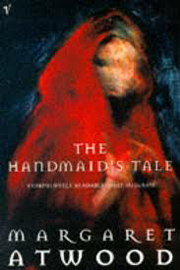 Atwood: Absolutely not. It’s case by case, when introducing any new species into an environment that has no immunity to it. People do that without thinking of the side effects. For instance, somebody introduced the Australian possum to New Zealand, where it’s just wreaked havoc. It eats all the indigenous flowers, which are the food of the indigenous birds. You can make very nice gloves and socks out of them [but] they shouldn’t be there.
Atwood: Absolutely not. It’s case by case, when introducing any new species into an environment that has no immunity to it. People do that without thinking of the side effects. For instance, somebody introduced the Australian possum to New Zealand, where it’s just wreaked havoc. It eats all the indigenous flowers, which are the food of the indigenous birds. You can make very nice gloves and socks out of them [but] they shouldn’t be there.
Chapter 16: Isn’t it inevitable that humans will find ways to mess things up with their technology?
Atwood: Are you saying that we should therefore not have any technology?
Chapter 16: No, I’m asking if it’s possible to have a check on it, or are we always going to be coming behind and cleaning up some horrendous mess?
Atwood: You are certainly going to be coming behind and cleaning up some horrendous mess, but you need not be coming behind and cleaning up every horrendous mess. In other words, some things don’t create horrendous messes. Some kinds kinds of gene splicing could potentially be very beneficial. For instance, one that makes cows burp less would be pretty good, to reduce the amount of methane added to the atmosphere.
Chapter 16: Is there a guiding principle that will prevent us from making those unnecessary messes?
Atwood: If we were omniscient, sure. What generally happens when there’s a horrendous mess is that people do things the side effects of which they haven’t contemplated. So, it’s a lot like traffic accidents. People don’t intend to have them. They don’t go around saying, “What kind of traffic accident can I have today?” They weren’t looking to the left, or they didn’t see the sign, or they didn’t see the bicycle, or whatever it was. They don’t do it on purpose.
Chapter 16: When you’re writing, is this an idea you carry in your head about your characters—that they don’t know what they’re doing?
Atwood: Do you always know what you’re doing?
Chapter 16: Hardly ever.
Atwood: Exactly. Yes, it’s true that we do not foresee all the consequences of our actions. How could we?
Chapter 16: Have you traveled much in the Southeastern U.S., which is generally not the first stop on book tours?
Atwood: Well, Atlanta has become a big deal; Austin, Texas, is a big deal.
Chapter 16: But you’re just making a brief trip to Tennessee this time, right?
Atwood: I’m going to the Grand Ole Opry. But apparently it had a flood.
Chapter 16: Yes, the Opry House was badly flooded back in the spring.
Atwood: It’s been relocated until they fix it?
Chapter 16: It was, but they’ve been able to move back now.
Atwood: What caused the flood, other than a lot of rain?
Chapter 16: Actually, it does seem to have been largely a matter of an ungodly amount of rain.
Atwood: Well, this is happening more and more. One of the predictions of the climate-change people is more extreme rainfall.
Chapter 16: That seems to be happening in many places. Pakistan, for instance.
Atwood: I sat beside a guy on a plane who’s in this business, and he said we don’t even have to measure the heat; we can measure the height of the waves because as things get warmer, the winds gets stronger and the waves get higher. So he’s measuring average heights of waves, which has something like doubled in the past thirty or forty years.
 Chapter 16: It’s difficult to wrap your head around all these things.
Chapter 16: It’s difficult to wrap your head around all these things.
Atwood: It is difficult, and that’s why everybody’s always arguing about it, but I don’t think there’s anybody anymore who says that the climate is not changing. It’s hard to deny that. There’s a lot of argument about what the cause is. One geologist to whom I spoke said we are in a warming cycle anyway, but it’s being accelerated and augmented by human behavior. So it is a combination of the two things.
Chapter 16: That’s your position?
Atwood: No, that’s what this guy told me.
Chapter 16: Do you have a position?
Atwood: I don’t have a position, because it’s not a question of having a position. It’s a question of accumulating to the best of your ability the knowledge that experts can provide you with, because you’re not a scientist and I’m not a scientist. We’re entirely dependent on what people who actually do the studies and measure things can tell us. So, in a way, we’re at the mercy of people whose business it is. We can only hope they’re doing their jobs properly. Quite frankly, you and I have got no idea. We know what we read in the papers. And we know how reliable the papers are.
Having grown up with a scientist, every time I read one of these studies, I go, well OK, how was it done? What were the checks and balances? Who has peer-reviewed this? You can’t swallow whole every new bit of stuff that comes out.
Chapter 16: But you have enough faith that you’re willing to alter your own behavior.
Atwood: That’s different. That, as you said, is faith. We try to take steps to insure that our faith is based on some kind of knowledge, but we are not experts. We cannot tell. We are very dependent in our society on what other people tell us. Gives you the willies, doesn’t it?
Chapter 16: It does. That gets back to what you said before—that no one knows anything.
Atwood: Well, a lot of people know different things. What we can do is certainly look at the cold, hard measurements, which are world temperatures and wave heights, and things like that. We know that they have changed and are changing. That’s not a question of belief or position. It’s just happening. That’s back to if I jump off the Empire state Building, it’s 99.9 percent certain I will die. The law of gravity does exist. That’s one thing we can pretty much know for sure. Much as we would like to fly without wings, there is that law of gravity.
Chapter 16: You said you sort of involuntarily volunteered for the activism you’ve done behind this novel. Do you plan to continue this work going forward? What are you working on next?
Atwood: Several things, but am I going to set up an office, start fundraising, hire a staff, and become a full time activist? No, other people are doing that. So, I can support what they’re doing, but there’s not much point in my duplicating it. There are now a number of different organizations that are very actively involved in these matters. Jonathan Franzen—a couple of years ago he set up an initiative among writers, he and Jonathan Safran Foer, that said we would each give one of our reading fees to an initiative called Air/Land/Sea, and that consisted of three American conservation organizations—they were American Bird Conservancy, Farm Forward, and Oceana. Those things are already up and going. The Nature Conservancy is up and going. I’ve donated to them. BirdLife I work with, and a number of others. I’m not going to duplicate what they’re doing. I’m going to support what they’re doing.
Chapter 16: You don’t foresee shaping any future writing projects around these issues.
Atwood: I didn’t shape this one around it. It just happened that way. And it was riotously funny at times, because we did say to each city, “Do it your own way. Pick your actors and singing groups. I’ll turn up and be the narrator”—which means that only me, and from time to time, Orville Stoeber, who is the composer, we were the only ones traveling. So we got everything from twenty-five-person, shout-out choirs to three professional woman singers doing a kind of Andrews Sisters act. We got everything from professional actors to—in Ely, England, at the Ely cathedral—we had two bookstore employees and one customer, and they were pretty good.
Chapter 16: Sounds more entertaining than the average book tour.
Atwood: Well, yes. We had something working for us, which is that it wasn’t Hamlet. Nobody knew what to expect. It was a book launch, so it was whatever it was, wherever we were.
Chapter 16: You’re not going to do any more theatrical tours?
Atwood: I think it would kill me, frankly. I’m not thirty-five any more. We could only do it with this one because it happened to have three narrative voices and hymns built in, which I didn’t foresee originally as having music to them. I wrote them to standard hymn tunes, which you can get off the Internet. There are a couple of sites where you can put in the title and it plays you the music. But I also used a very useful hymnbook we have in Canada that was put together by what you would call the Episcopalians and what you would call the Methodists, and it’s got a wide range of different tunes. So I wrote the hymns to those tunes, but then Orville Stoeber, who’s the partner of my agent, started reading the manuscript when she was reading it, and began channeling the music. So we just said, “Go Orville.” He wrote them all.
Chapter 16: It’s kind of irresistible for any composer.
Atwood: Yes, but I wasn’t anticipating it, so that when the BirdLife people said, “How should we do this?” I already knew that I had three narrative voices and I had this music, so we could just do it.
Chapter 16: Are you working on another novel now?
Atwood: Yes, but I’m also working on a book that’s called In Other Worlds. It’s about science fiction, speculative fiction, and that area. It will be the Ellman Lectures, which I’m giving the end of this month in Atlanta, at Emory.
Chapter 16: Do you know when that will be published?
Atwood: Next fall. I’ll put into it some of the other pieces I’ve written in this area, which turn out to be kind of numerous. I have an introduction to, for instance, Brave New World, and I have one to The Island of Doctor Moreau, and I have one to Rider Haggard’s She. If you go online [to The New York Review of Books], you will find my long review of Ursula Le Guin.
Chapter 16: Is your new book speculative fiction?
Atwood: It’s the third one of the Oryx and Crake [series]. The number three is so much more stable than the number two.
Chapter 16: Do you see that as the end of a trilogy?
Atwood: I never foresee any end to anything, but I would assume that it’s the end. I would not predict that it’s the end.
Chapter 16: Well, that seems like a good place for us to end.
Atwood: Yes, but you can add on to that, no, I do not predict the future.
Chapter 16: Probably a good policy.
Atwood: I think it’s an excellent policy.
Margaret Atwood will give the keynote address to the ninth annual Belmont Humanities Symposium on October 27 at Belmont Heights Baptist Church at 7 p.m. She will also participate in a panel discussion on October 28 at 9:30 a.m. in the Massey Boardroom on the Belmont University campus. Both events are free and open to the public.
